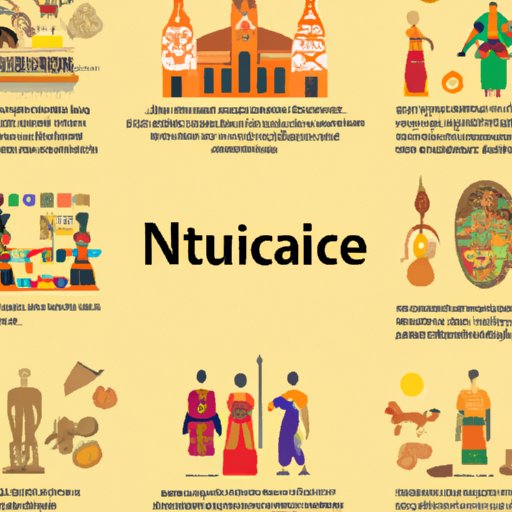Introduction
National culture is a shared set of values, beliefs, customs, norms, and practices that are unique to a particular country or nation. It reflects the collective identity of a nation and shapes the behavior of its citizens. This article will explore the history, influences, components, and impact of national culture, as well as discuss ways to preserve it.

Examining the History of National Culture
The origins of national culture can be traced back to the early days of human civilization. As civilizations developed, distinct cultures began to emerge in different regions of the world, each with its own set of values, beliefs, and practices. Over time, these cultures evolved and changed, influenced by events and movements such as wars, migrations, and technological advancements.
Throughout history, nations have gone through periods of cultural transformation. For example, the French Revolution of 1789 brought about sweeping changes in the art, literature, and social structure of France. Similarly, the Industrial Revolution of the 19th century had a profound effect on the culture of many European countries, leading to the emergence of new social classes and the rise of the middle class.

Exploring the Influences on National Culture
National culture is shaped by a variety of factors, including geography, religion, language, politics, economics, and social structures. Each of these influences plays a role in shaping the values, beliefs, and practices of a particular nation.
Geography has an especially strong influence on national culture. For example, the hot climates of tropical regions tend to lead to more relaxed attitudes and slower lifestyles, while the cold climates of northern regions tend to lead to more efficient and organized societies. Religion also plays an important role in shaping national culture, as different religions often have distinct sets of values and beliefs.
Language is another key influence on national culture. Different languages create different modes of communication, which can lead to different ways of thinking and behaving. Politics and economics also shape national culture, as different governments and economic systems tend to produce different values, beliefs, and practices. Finally, social structures have a significant impact on national culture, as different societies often have distinct hierarchies and ways of interacting.

Analyzing the Components of National Culture
National culture is composed of several distinct components, including values, norms, beliefs, attitudes, customs, and practices. Values refer to the shared principles and ideals that guide a society’s behavior. Norms represent the accepted behaviors and practices of a society. Beliefs refer to the accepted truths and convictions of a society. Attitudes refer to the emotional reactions of a society towards certain issues. Customs refer to the traditional practices of a society. Finally, practices refer to the day-to-day activities of a society.
Investigating the Impact of National Culture on Society
National culture has a significant impact on society. It helps to define a population’s cultural identity, unifying people under a shared set of values, beliefs, and practices. It also contributes to social cohesion, as it gives people a sense of belonging and purpose. Finally, national culture affects intercultural communication, as it shapes the way people from different countries interact with one another.
Discussing How to Preserve National Culture
Preserving national culture is essential for ensuring the survival of a nation’s unique identity. There are several ways to do this, including education, media, government policies, and the preservation of cultural heritage. Education is important for teaching people about their cultural heritage and instilling a sense of pride in their nation’s culture. Media can be used to promote cultural awareness and appreciation. Government policies can help to protect cultural traditions and practices. Finally, the preservation of cultural heritage sites and monuments can help to ensure that a nation’s past is not forgotten.
Conclusion
This article has explored what is national culture by examining its history, influences, components, and impact. It has also discussed ways to preserve national culture. National culture is a powerful force that shapes the collective identity of a nation and helps to foster social cohesion. It is essential that we recognize the importance of preserving our national culture in order to ensure its survival into the future.
(Note: Is this article not meeting your expectations? Do you have knowledge or insights to share? Unlock new opportunities and expand your reach by joining our authors team. Click Registration to join us and share your expertise with our readers.)
